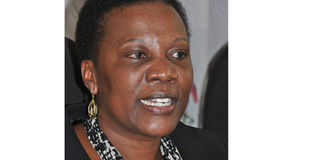Why Muloni is among the 25 leaders to watch in Africa

Energy Minister Irene Muloni. Uganda is one of the promising and upcoming African petroleum provinces. PHOTO BY RACHEL MABALA
What you need to know:
- It remains to be seen whether Energy Minister Irene Muloni will find a compromise on reviving the stalled East African Crude Oil Pipeline and give Total and China National Offshore Oil Corporation, an export route for their oil.
The year 2020 will either root uncertainty in Uganda’s oil sector or bring a decisive action plan for the country to join other African oil producing countries.
This partly explains why Energy and Mineral Development Minister Irene Muloni is among the 25 people to watch in Africa’s energy sector next year. This follows a new list released by the African Energy Chamber aimed at profiling key individuals and organisations who will drive key developments within the oil and gas sector.
Providing a window to what key developments and advancements the African energy sector can look forward to in 2020 and beyond, the list profiles key individuals who stand to contribute significantly in shaping the continent’s energy economy.
According to the 2020 outlook, Uganda is one of the promising and upcoming African petroleum provinces. But oil was discovered over 10 years ago, almost at the same time with the Jubillee fields in Ghana. While Ghana is now producing, Uganda’s oil is still in the ground.
So, it remains to be seen whether Ms Muloni will find a compromise on reviving the stalled East African Crude Oil Pipeline and give Total and China National Offshore Oil Corporation (CNOOC), an export route for their oil.
The list profiles key industry deal makers such as Aliko Dangote, the chairman of the Dangote Group which is nearing completion at its 650,000 bpd Lagos-based game-changing refinery; United States President Donald J. Trump whose America-first oil politics are likely to affect global prices and the appetite of American majors to look outside; Ghana’s Kevin Okyere who sits on one of the continent’s most promising assets after his Company Springfield’s West Cape Three Points Block 2 discovery, and many more.
“We hope to put all key role players to task, we want to challenge them and pose the questions,” said NJ Ayuk, executive chairman of the African Energy Chamber and author of Amazon best-selling book, Billions at Play: The Future of African Energy and Doing Deals.
“This year, the continent has seen improved cooperation and investment, large scale discoveries, world-scale projects coming online that make Africa the world’s hottest oil and gas frontier. The next step is to find out how we can maintain this momentum and the people on this list can certainly provide answers. Africans should demand more from them,” Mr Ayuk added.
The list forms part of the African Energy Chamber’s African Energy Outlook which provides an overview of the oil and gas sector across sub-Saharan Africa, focusing on strategic, operational and investment trends in the industry.
Final Investment Decision
Albertine Graben Refinery Consortium – a group of international companies that agreed with the government to invest in, construct, and maintain the proposed refinery in Hoima District, Africa Investment Forum announced $20 million (Shs73.9 billion) investment to support the Refinery Final Investment Decision (FID).
FID is an agreement on capital investments on a long term project: when money for the project is availed and project begins. FID is expected to pave way for the Engineering, Procurement and Construction phase, and subsequently the start of commercial oil production.
Oil companies say first oil will flow 36 months after the FID.




